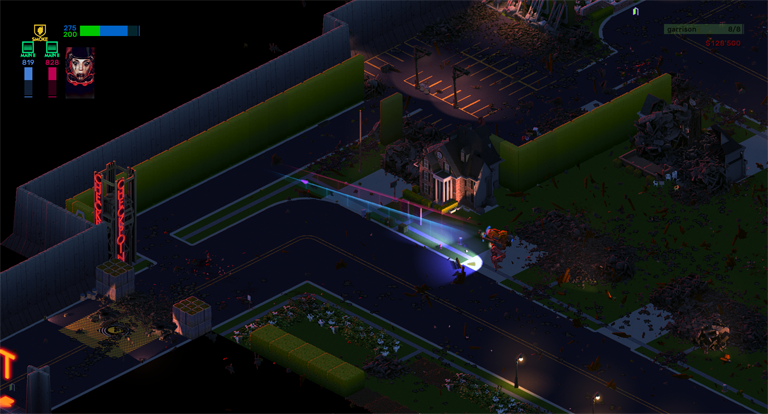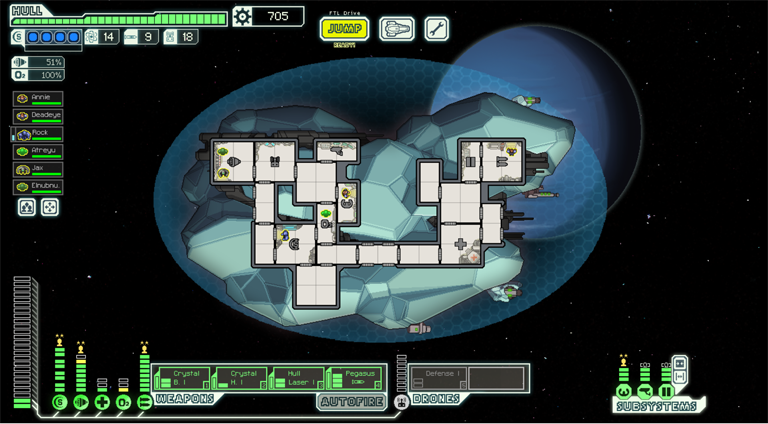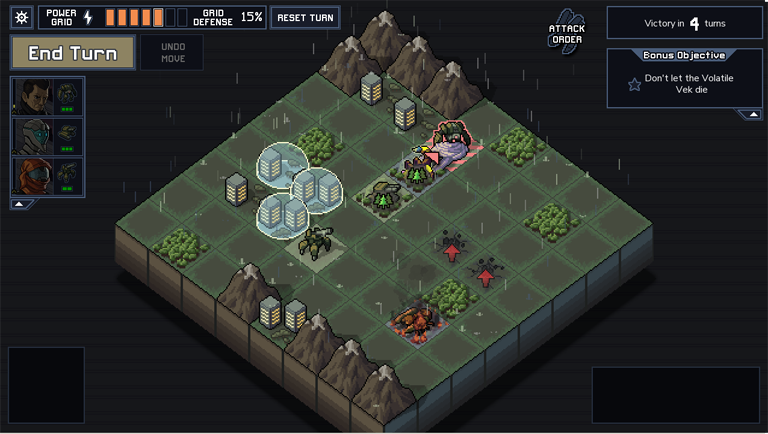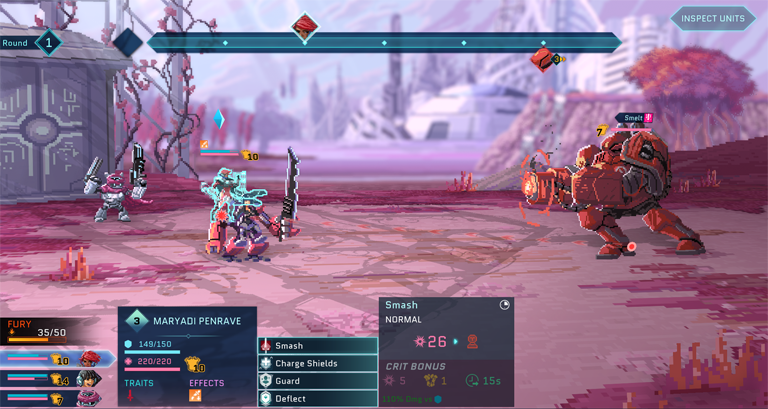When Michael Toy and Glenn Wichman made Rogue in 1980, the two university students probably had no idea their little ASCII gem would spawn an entire gaming subset. All they were trying to do, after all, was create a stat-driven, turn-based RPG that would include procedurally generated levels and permadeath.
Fast-forward 40 years, though, and rougelikes are all over the place. From shooters (like SYNTHETIK: Legion Rising), to platformers (Dead Cells); from RPGs (Star Renegades), to… Whatever you call oddballs like FTL and Into the Breach (spaceship crew manager? combat checkers?), the concepts of permadeath and procedural generation are an ingrained facet of gaming embraced by player and dev alike...
But is being a roguelike an actual “feature”? And should it meet with the resounding approval it receives?
When Toy and Wichman included permadeath and random levels in Rogue, it was simply because game design was the only arena they could truly compete in. Programming and hardware limitations of the time put a hard cap on what could be achieved in terms of graphics, sound, or complexity, so they focused on gameplay instead.
Their game had rudimentary graphics, no sound, a bare minimum of player interaction and no possibility for emotional investment. When the player character died, starting over posed no real issue because the player character was little more than three stats on a single line of text and the game had no plot to speak of.
Compared to the binary capabilities of 1980s programming, today’s games offer players unparallelled freedom and complete immersion in fully realized worlds, with photorealistic graphics, orchestral soundtracks, astounding visual effects, lifelike animation, complex stat-based mechanics, behavioral patterns, plots written by award-winning writers and even performances by famous actors. Gaming is no longer the domain of the aspiring amateur, but an art-form backed by a billion-dollar industry. There is no longer a need for simple tricks like permadeath to attract an audience... So why are roguelikes still a thing?
Don't get me wrong: I am not advocating the removal of a whole genre here (mostly because I can't, but also because I don't meddle: someone wants to make a roguelike — they should be free to go and do it). Many games (some of which I enjoy) put roguelike mechanics to good use.

Brigador, for instance, uses it to craft tense action gameplay that lets you keep "material" progress (vehicles you unlock) upon death, while restarting the gameplay loop from scratch. But the reason its roguelike mechanics work is that Brigador lacks a tangible player character. Your character is implied – or rather the character is the player (you). There is no in-game intermediary that you can invest yourself into, so there is no real emotional loss when a character you can't see dies. In Brigador, dying is akin to losing at a coin-op arcade: a loss of sorts, to be sure (you're out a quarter), but one without an emotional impact.
Unfortunately, for every game that uses the roguelike formula well (or beningly, at least), there are three that do it badly – using it as a crutch to conceal boring gameplay, bland level design or a general lack of originality.

Faster Than Light (FTL) is the first offender that comes to mind. In it, you are given a ship and crew that are meant to traverse eight levels and survive one heck of a hedged boss-fight. So far so groovy. But over the course of a single gameplay loop (which lasts two hours on average) you personalize your anonymous ship and your crew grows from faceless drones to brave little sprites central to the whole experience. With that ship and that crew you overcome countless cirses – navigating battles, events and all manner of danger... And then – at the two hour mark – poof! Win or lose, the ship you have customized and the crew you have grown fond of disappears – never to be seen again.
To add insult to injury, FTL's "procedural levels" seem to be randomly unfair, with odds stacked against you to such an extent, so frequently that – often times – your playthrough will be untenable by level two or three – never mind eight – regardless of how well you play. Call me cynical, but it's almost like FTL devs (Subset Games) knew their game was so shallow that, without the roguelike mechanics enforcing multiple playthroughs, people would get bored with it quickly...

Into The Breach (again, from Subset Games) follows the FTL formula to a tee – and then takes it one step further. Here, the roguelike playbook (along with some gorgeous pixels, intriguing backstory and noteworthy soundtrack) is used to cover up the fact that – at its core – the game is very, very simple. Like – "rock, paper scissors" simple... And would you pay 15 USD for rock, paper, scissors? Of course not... But a "futuristic roguelike about robots staving off an alien invasion with a dash of time travel for good measure?" Sure. Some definitely would.
Saving the worst for last, Star Renegades is the oddest roguelike offender I have ever wasted my time on (read: played). Oddest, because I can't fathom what the devs (Massive Damage) were trying to accomplish with their weird mix of awesome and awful.

Introducing roguelike mechanics into FTL and Into The Breach at least makes sense: both games have short gameplay loops (1-2 hours), so having to restart them often gives you more reason to continue playing. But a single Renegades playthrough is about 8 hours long. Still not single-player game territory, but definitely long enough to push it out of the realm of casual gaming.
In those 8 hours, you are introduced to gameplay mechanics that – while not that deep – are substantial enough to be entertaining. There's some light exploration, a little strategy, extensive combat and inventory systems and an intriguing "friendship" mechanic that lets your characters increase affinity with one another, which nets you more powerful combos during combat. Put together, there's a nice, standalone game in there which – with a bit more effort – could function well as a tactical, turn-based combat RPG...
But looming over this nice game with its vibrant graphics and engaging gameplay is the roguelike system which 1) stacks the odds against you being able to finish the game; and 2) wipes out 8+ hours of camraderie if a party you like gets hit with a few unlucky RNGs.
Opposed as I am to roguelike mechanics, I can still justify "wasting" an hour or two on a fun game, so long as you don't lose anything worthwhile if your playthrough doesn't pan out. But – eight hours? That's a whole working day, folks. That's plenty of time to form attachments to your party. And bad enough if it's 8 hours you lose because you messed up – but 8 hours you can't win? That's just downright mean.
I know, at their core – as a form of entertainment – computer games are already unproductive, but wasting 8 hours on something you get nothing out of feels a bit insulting.
As a genre, roguelikes are a valid design choice – but not all roguelikes are created equal. For some (possibly most) developers, they present an easy way to (undeservedly) stretch out the interest of their title, creating unnecessary hurdles for the player to stumble over to cover up the fact that they simply couldn’t make the game interesting enough to function without ‘em.
A better approach to game design would be to focus on coming up with new, innovative mechanics, solid writing, or simple points of interest that would guarantee player involvement… But being original, innovative, and proficient is quite difficult and, for certain devs, it is much easier to simply make a good-looking game that everyone’s played before and then slap the same, tired, old roguelike label on it to "set it apart" from the herd.
I can’t help but think that while randomly generated levels offer great replayability, coupling them with permadeath is cheap and underhanded. It can often lead to unwinnable situations that waste progress and the player’s time for no good reason. There’s nothing wrong with a challenge. A challenge you can’t win, though, is a pointless endeavor.
I’m happy that Rogue was made. It offered a mechanic that nobody had considered in a game with Actual Things to Do (like stats, an inventory, and a randomly generated goal – instead of points, lives and a distant finish line).
But constantly relying on the 40-year-old ideas it introduced is – at this point – not doing anyone any favors and (worse) undermining the development of new and interesting ideas (although it could be argued that people who resort to roguelike mechanics, weren’t gonna be much use in the “innovative thinking” department, anyway). Devs: the next time you consider including permadeath in your procedurally generated game, please take the fact as a warning light, step back and consider other ways to make your project engaging.
And players— Life's not a loop. Go play whatever makes you happy.
Pig Recommends:
-
saying "no" to roguelikes: why not try a nice, long RPG with comfy save-scumming instead?
-
if you have your heart set on ‘em, though, try Brigador for a fun mech/tank/hovercraft action-romp to the tune of great synth music interspersed by heavy gunfire and countless explosions;
-
Synthetik: Legion Rising offers a lot of tactical shooting fun and many, many, many guns — only mind the discouragingly-steep difficulty spike towards the end of the game (fun fact: the classes I play are all maxed out — still haven’t finished the game once);
Honorable (non-game) Mentions:
- Edge of Tomorrow, Boss Level (movies) – for theatrical renditions of roguelike mechanics and some really fun times;
